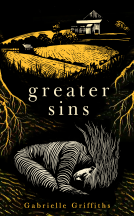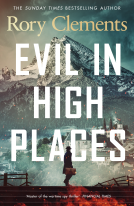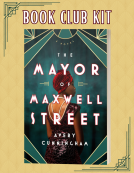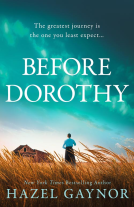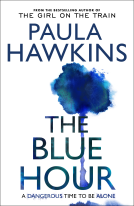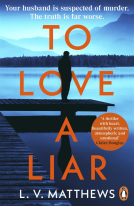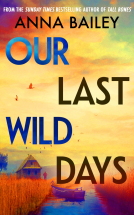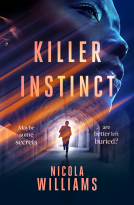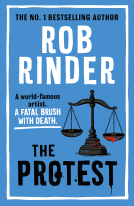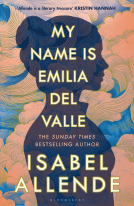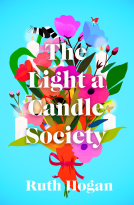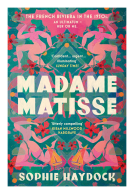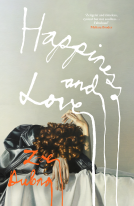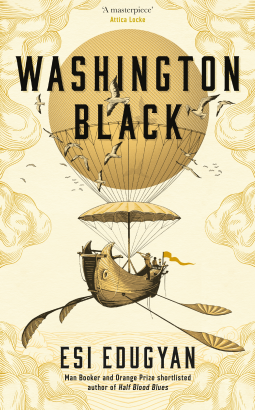
Washington Black
Shortlisted for the Man Booker Prize 2018
by Esi Edugyan
This title was previously available on NetGalley and is now archived.
Send NetGalley books directly to your Kindle or Kindle app
1
To read on a Kindle or Kindle app, please add kindle@netgalley.com as an approved email address to receive files in your Amazon account. Click here for step-by-step instructions.
2
Also find your Kindle email address within your Amazon account, and enter it here.
Pub Date 2 Aug 2018 | Archive Date 7 Sep 2018
Serpent's Tail / Profile Books | Serpent's Tail
Talking about this book? Use #WashingtonBlack #NetGalley. More hashtag tips!
Description
Available Editions
| EDITION | Other Format |
| ISBN | 9781846689598 |
| PRICE | £14.99 (GBP) |
| PAGES | 288 |
Featured Reviews
 Edith S, Book Trade Professional
Edith S, Book Trade Professional
Esi Edugyan lives in Victoria, British Columbia and was a finalist for the prestigious Man Booker Award for her previous work “Half Blood Blues”. I have to confess I had never heard of her before. After having read the proof of her upcoming new novel “Washington Black”, I am no longer surprised why she was shortlisted. The quality of her writing is superb, reminding me of the language in classics. It was a pleasure to read such finely crafted writing and such a captivating story.
I am sure “Washington Black” will appeal to readers who enjoyed “Homegoing” by Yaa Gyasi or “ Underground Railroad” by Colson Whitehead.
This literary novel is set in the cruel world of slavery in the early 19th century narrating the incredibly adventurous life story of George Washington Black, “Wash”, a slave boy born on the Faith Plantation in Barbados. The barbaric way plantation owners used to get the outmost of their “human merchandise” cutting sugar cane is truly incomprehensible, the cruelty and punishments beastly. Such is the daily life of the child slave Wash who is lucky to have the fierce protection of Big Kid, the closest thing he ever knows to a mother. His life changes dramatically when they are ordered to serve at a dinner in the big house where Erasmus Wilde is entertaining his brother Christian “Titch” Wilde, a scientist who recognizes something in the boy. Titch, a wealthy eccentric explorer is opposed to slavery unlike his brother whose cruelty knows no boundaries. He begs his brother to loan Washington to him to assist with scientific experiments. Washington has a quick mind but never having known kindness from white people he has to shed his mistrust before learning to read and write becoming an invaluable assistant to Titch who is building a “cloud cutter”, an early version of an air balloon. Events heat up when Titch’s and Erasmus cousin Philipp visits the plantation from England leading to two terrible accidents and a death, disfiguring Washington. The hasty escape of Titch and Wash by their newly build cloud cutter is the beginning of an unimaginable journey to freedom for Washington, his coming of age in strange countries, surviving danger and slave catchers together with Titch who recognizes in him a human being becoming his family and friend. When Titch suddenly disappears in the Canadian Arctic, Washington is lost and forced to fend for himself. His travels to his true inner freedom lead him to many countries, Nova Scotia, England, Holland and Morocco trying to answer the question what true freedom really means .
There is a German translation of “Half Blood Blues” by Insel Verlag but I could not find a German publisher yet for this novel.
 Neil G, Reviewer
Neil G, Reviewer
The Man Booker Prize goes retro!
I have spent much of the past 2-3 years reading novels that are non-linear, multi-narrator, stream-of-consciousness and other buzz words. It seems that the 2018 Man Booker judging panel have at least partly (I haven’t read Milkman or The Long Take yet, for example) turned away from that and gone for accessibility. Even The Overstory from Richard Powers is his most readable book.
Washington Black is a good book. It is immensely readable. It is a straightforward first person narration with a linear timeline. And there is nothing wrong with that!
We begin by meeting George Washington Black, an 11 year old slave on a sugar plantation in Barbados in the company of a woman call Big Kit. The first few pages of the book read like a slavery novel and they are pretty difficult to stomach. Like me, you may find them so unpleasant you wonder if you can keep reading. I suggest you do keep reading because the unpleasantness does not last for many pages and what looked like a slavery novel turns into a 19th century adventure novel, albeit with overtones. Within a straightforward adventure story, Edugyan finds time to write about freedom, slavery, identity and racism.
"I could feel the day’s exhaustion descending on me. 'What it like, Kit? Free?'
I felt her shift in the dirt, and then she was gathering me in close, her hot breath in my ear. 'Oh, child, it is like nothing in this world. When you are free, you can do anything.'
'You can go wherever it is you wanting?'
'You go wherever it is you wanting. You wake up anytime you wanting. When you free,' she whispered, 'someone ask you a question, you ain’t got to answer. You ain’t got to finish no job you don’t want to finish. You just leave it.'
I closed my heavy eyes, wondering. 'Is it really so?'"
This is early on in the book and Black soon leaves the plantation for his adventure and learns that freedom is not so easy and not so simple. It becomes a globe-trotting story that takes us to the USA, the Arctic, Canada, London, Amsterdam and Morocco. By the time we finish, Black is an adult with what feels like more than a lifetime of experience behind him.
This is novel that cries out to be a movie. It played like a movie in my head as I read it. There are scenes that you can picture exactly how a director would film them. It has action (storms at sea, storms in the desert, storms in the snow), violence (slave abuse, bar fights), love interest, friendship that grows unexpectedly and is tested to its limit. It has just about everything you could want for an action movie (well, it is set in the 19th century, so there are no car chases, but you can’t have everything).
I’m glad the Man Booker jury chose a book like this. It shows that someone can write a “normal” book, can write it well, and can include bigger ideas in a very natural way. I guess some of the depth might be lost in a movie because Edugyan does a good job of exploring the inner workings of her characters and that’s hard to communicate visually. So, read the book!
My thanks to Serpent’s Tail for a review copy via NetGalley in exchange for an honest review.
 Alan M, Bookseller
Alan M, Bookseller
This is an exuberant, rollicking page-turner of a novel, a sprawling adventure of a runaway slave and an epic journey from Barbados, to America and London and Amsterdam, ending in the Moroccan desert. Longlisted for this year’s Man Booker, this is a rewarding read.
Set in the 1830s, this is the story of George Washington Black (‘Wash’), on the run accompanied by the brother of his former plantation owner. A bounty on his head, he feels pursued on a relentless journey, until Christopher, the brother, himself disappears in a blizzard in Arctic Canada. The mirroring of the narrative now sees Wash continue to search for his former saviour as he continues to be pursued. The book touches on education as an escape – Wash finds solace and reward in his painting, is taught to read and write, and finds wonder in science and nature. There are obvious issues of family, as Wash finally learns the identity of his mother in plantation records housed in London after slavery has been abolished in his homeland. And, obviously and centrally, the book deals with slavery, about ownership, and about identity. Edugyan resists the temptation to give us a nice, neat reconciliation by the end of the book. There is a space, words unspoken, no final understanding between the former slave and the figure of Titch: ‘life had never belonged to any of us’.
There are moments of real emotion, as Wash meditates on what his mother must have felt and thought as she was transported from Africa on a slave ship, and the issues at the heart of the novel obviously ring true today, still, as we continue to struggle with the lessons of history and the fight for equality that continues. A big, bold story that deals with big issues, I felt this definitely deserves its place on the longlist. A 4 star recommend.
(Thanks to NetGalley and the publisher for an ARC of this book.)
 Meike S, Media/Journalist
Meike S, Media/Journalist
Longlisted for the Man Booker Prize 2018
The Booker judges seem to be eager to add quite some material that is highly accessible and easily readable this year, but while the inclusion of Snap seemed outrageous to me, this is a defendable choice. Edugyan writes about slavery, racism, and identity, but in the form of an adventure novel, told chronologically and in the first person. While this makes for a rather conservative narrative strategy, the author clearly knows how to compose an engaging and compelling story - and there is depth, too.
Our protagonist is George Washington Black who at the beginning of the story is an 11-year-old slave on a sugar plantation in Barbados. When the new owner's brother arrives and needs help for his science project, Wash, as people call him, gets the chance to get away from the vicious and sadictic cruelty the slaves on the plantation have to endure. Christopher Wilde, or "Titch", as the young scientist is called, borrows Wash from his brother so that he might help him work on an airship he designed - by that, Wash first gets the chance to learn about science and nature, which, along with drawing, will turn out to be his passion. When Wash, without his own doing, gets into trouble that might cost him his life, Wash and Titch flee Barbados with their "cloud-cutter".
From there on, Wash roams the world, first seeking safety as he is a runaway slave, later, when slavery is abolished, still fearing bounty hunters and looking for Titch - I will not spoil how they got separated, but I will say that Wash travels to the US, the Arctic, Canada, London, Amsterdam, and Marocco. We learn more about Titch's twisted family and witness how Wash tries to build a life, pursuing his interests in science and art.
All of this is intriguing as an adventure novel, but Edugyan also discusses the hardship Wash has to endure, because even when slavery was abolished, racism of course persisted. Wash struggles with his identity, constantly forced to look into the gap between his own potential and what society sees in him. The writing is particularly strong when Edugyan writes about the psychology of her characters, what drives them and how they suffer from their flaws and past injuries, mental and phsyical. For instance, the question arises why Titch decided to help Wash: Is he, the white upper class scientist and abolitionist who finances his endeavours with money earned by the plantation, a good person, or does he just pursue self-serving goals? Sometimes it seems like Titch does not know himself.
Sure, the novel partly comes close to a fairy tale and the narrative skeleton that carries Wash's travels always shines through - much of what happens is highly unlikely, or as the text itself puts it: "You are like an interruption in a novel, Wash. The agent that sets things off course." But realism is not the point here, Edugyan talks about history and human nature in the form of an allegory, and there are many smart ideas and strong images. This is an enjoyable, intelligent read that leaves room for interpretation and discussion.
 Media/Journalist 174279
Media/Journalist 174279
Not what I was expecting at all and all the better for it! When the book opened I assumed I knew what to expect, a literary and well written but ultimately tragic look at slavery - instead within a couple of pages the book took off and flew, literally and metaphorically! I loved the pace, the characterization and above all the inventiveness and was delighted to see it on the Booker long list.
 Reviewer 354493
Reviewer 354493
What a compelling read. A worthy addition to this year’s Booker longlist, and one I’m not sure I would have been aware of otherwise - the best part of literary prizes such as the Booker!
Washington Black is an exciting mix of historical and literary fiction, sort of like a Victorian steampunk bildungsroman set in 1830s West Indies and beyond. Safe to say, I haven’t read anything quite like it.
The book starts out at Faith Plantation in Barbados. The eponymous Washington Black, or Wash for short, is a young black field hand, about 10 years of age when the book begins. The master of Faith Plantation has not long died, and a new master arrives in his wake. One day, this new master’s brother, Christopher Wilde (or Titch to those close to him), decides to pluck Wash from the life he has known and the people who filled it. This sets of an awakening. Wash’s world broadens as he discovers the wonders of art and science and learning. Even as he becomes more comfortable, coddled into a feeling of security, he starts to feel separated from his roots. He can’t really go back as he will be ”even more despised and pitied, a twisted black Englishman.”
His actual full name is George Washington Black, as named by the previous plantation master. An ironic, mocking moniker that highlights the callous cruelty towards black slaves during that era. Like his namesake, Wash ends up making three crossings of his own; to North America, to England and the European continent, and then to Africa.
The novel is quietly complex, dealing with multiple themes that left me with many thoughts to ponder over. It outlines the rampant racism and savagery of slavery in that era, before Emancipation, and the lasting impacts beyond this. It also deals with questions of freedom and personhood. Living with Titch, Wash had thought he had freedom. It was more than he had ever known. But like he had been told previously of what it truly meant to have freedom: ”if he did not feel like working, the free man tossed down his shovel. If he did not like a question, he made no answer.” It was poignant reading of how Washington became gradually aware of himself as a person and a black man; from relative innocence and belonging, to a tectonic shift between his identity and his heritage, later learning of the lasting shackles wrought by nervous fear and brutality, before being plagued with a sense of isolation and despair and abandonment. In the end, it’s hard to even recognise himself, harder still to belong.
Titch was an interesting character, himself grappling with the concept of freedom and personhood alongside Wash, burdened by guilt and grief, seeking a redemption that eludes him. Even as he values science and causes such as the ending of slavery, he seems oblivious of his effect on Washington’s life. For a while, he was all Wash knew, so it was a painful truth to later realise that in contrast, he was not as significant a fixture in Titch’s life: ”I was nothing to you. You never saw me as an equal. You were more concerned that slavery should be a moral stain upon white men than by the actual damage it wreaks on black men.”
It seems that as Wash becomes unmoored from his origins, he becomes drawn to others who are similarly rootless and seeking to be truly free. He meets Tanna Goff, the other character who features more prominently later on in his young life. She is of mixed race, and has a privileged life. She has faced similar struggles with being accepted in the society she lives in, thus colouring her perspective on the history Washington shared with Titch, something that Wash had been almost romanticising. In the end, it all seems to come full circle.
I really enjoyed this and am glad to have read it, and will certainly be interested to read more by Esi Edugyan in the future. Glad that the Booker Prize has brought her writing to my attention, and I’ll be hoping that it makes the shortlist!
I received a free review copy from the publisher in exchange for my honest unedited feedback.
 Nick B, Reviewer
Nick B, Reviewer
When we first meet George Washington Black, he is a field slave at the Faith Plantation, Barbados. The Plantation is taken over by Erasmus Wilde, a cruel and vindictive master who treats his animals with more respect than his slaves. Thus begins a well-told but fairly routine slavery+cruelty story.
Then Washington’s fortunes change when Erasmus’s brother Christopher comes to stay. He is an idealist and inventor; he needs an assistant to help him build a giant balloon in which he hoped to cross the Atlantic. He is invited to live with Christopher, to call him Titch, to eat fine food and speak his mind. Wash struggles to accept these freedoms, perhaps mindful that they only exist as long as Titch is prepared to let them exist.
Then a paradigm shift and we are with Titch and Wash aboard a trading ship plying its way to Virginia. The captain and medic seem somewhat nonplussed to have given refuge to an obvious runaway slave. We have a historic maritime novella, reminiscent of Joseph O’Connor’s Star of the Sea or Ian Maguire’s The North Water. It is well done and there is a sense of menace and tension.
Then we have a stay in Arctic Canada looking at marine life.
Then on to Nova Scotia where Wash finds romance but lives in fear of recapture.
Then to London, trying to engage with Titch’s aristocratic family.
Then to Amsterdam.
Then to Morocco.
This is a plot driven novel with vivid detail. Esi Edugyan evokes four different worlds in vivid colours. But, the story never quite convinces. The characters don’t have a great deal of depth despite having plenty of action. Even Wash, the narrator, really just feels like an everyman. The main characters all do things for no obvious reason. Why does Cousin Philip shoot himself? Why does he visit Erasmus at all when he has such an unhappy history with the man? Why does Mr Wilde pretend to be dead? Why did Titch walk away from Wash? Why did John Willard keep trying to track Wash when there was no longer a bounty to be had? Why would Erasmus place such a large bounty on a slave in the first place when he thought them no more and no less than livestock?
The shifting across different worlds also produced what felt like several different stories with several different atmospheres – almost like David Mitchell’s Cloud Atlas, with only the slenderest of threads to hold them together. And given the issues of character motivation, each subsequent section became slightly diminished. The final section, England (although much of it was in Morocco) felt confusing and didn’t really provide the resolutions it set out to achieve.
This doesn’t make Washington Black a bad book. Much of it is compelling, visceral. It is never less than readable and the progression from Barbados to the sea to Canada to England to Morocco is innovative for a 19th Century historical novel. There is something steampunk about the ballooning; the slave section is as good a slave narrative as any; the journey at sea is rollicking. There is an air of menace and tension through much of the novel - although this starts to dissipate in Nova Scotia and is gone by London. There is a sense of how a black person might have fitted in to various different communities. There are questions about the nature of freedom, particularly when bound by societal expectations, station of birth, and the threat that freedom might be taken away.
But there is an abiding sense that this has fizzled after a really stunning first half.
How does that all stack up? Being generous, perhaps four stars.
A great read. George Washington Black is a slave boy, on a sugar plantation in Barbados; he is selected to become the scientific assistant to the master's brother, Christopher 'Titch' Wilde. The narrative carries the reader through the many adventures and explorations the two embark upon - flying off in Titch's balloon-like contraption to escape mortal danger for Wash, pushing up to the Arctic to look for Titch's father, Wash's journey across America and Europe, and his own scientific endeavours.
The story spans slavery, oppression, scientific discovery, travel, relationships, love, freedom... a whole host of themes which knit together beautifully to form a cleverly crafted story. Highly recommended.
 Pam S, Reviewer
Pam S, Reviewer
This book begins on a sugar plantation in Barbados. Our main character Was (Washington Black) is an 11 years old slave, whose master just changed. The masters brother (Titch, who is a scientist) wants him to be his own assistant, and from there, his life changes.
The book addresses some topics really well, embedded into an adventurous story. Cruelty of slavery, prejudice, family, love, etc. It's very rich in content and has multiple layers. This complexity is what makes it special. There's a suspense which makes you keep reading. And I enjoyed Eduyan's character development a lot.
I would definitely recommend it. It's on the Man Booker long list as well.
Thanks to NetGalley and the publisher for granting a copy in exchange for an honest review.
